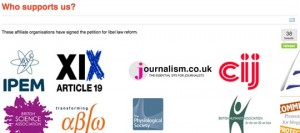The excellent Jack of Kent blog asks if the reforms to libel legislation in England and Wales put forward by Lord Lester in May will be hindered by a lack of parliamentary resource and time.
The bill, which would expand the fair comment defence and reform the law to better reflect online publications, will have its second reading in the House of Lords on 9 July. But, says Jack of Kent’s author David Allen Green:
The coalition government has not committed itself to any parliamentary time for libel reform in the current legislative session, a session which could last until November 2011; similarly the Ministry of Justice has not committed any departmental resources to putting a bill through parliament.
(…)
However, if the bill which does go forward from the debate on 9 July 2010 is not actually a good bill then it may be that such a ‘fail’ is not really a problem, and the libel reform campaign should look forward to the 2011-2012 session.
Related reading: The BBC College of Journalism’s Kevin Marsh on libel reform and whether the public’s voice is being heard in the debate.

